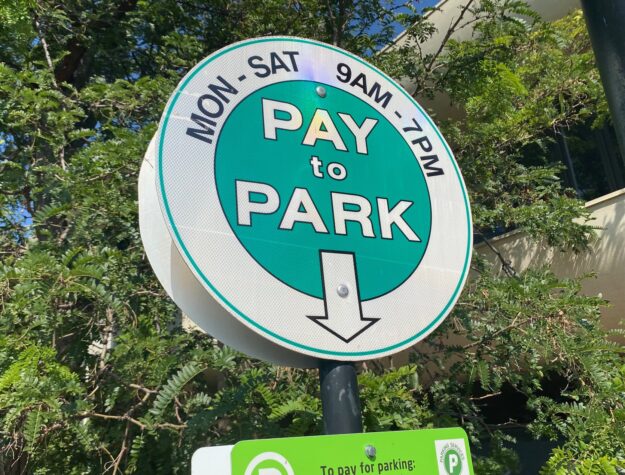Widgetized Section
Go to Admin » Appearance » Widgets » and move Gabfire Widget: Social into that MastheadOverlay zone
Opinion: Parking minimums add to housing crisis, adversely impact environment

A parking sign in downtown Boulder (Quentin Young/Colorado Newsline).
In May, a potentially transformative statewide land use bill died, hindering Gov. Jared Polis’ plan to resolve Colorado’s severe housing shortage.
The failure of the land use bill — Senate Bill 23-213 — was disappointing, but not surprising. Politically, Coloradans tend to favor local government control, and the bill mandated that municipalities meet the state’s new standards for multifamily housing density in specified areas and effectively abolished single-family zoning by permitting additional dwelling units. More than 50 municipalities opposed what was considered a “one size fits all” approach to governing.
However, overshadowed by the contentious housing mandates was a policy that, alone, may have stood a better chance, and could have wrought enormous social and environmental benefits: parking reform.
Parking reform is a catch-all term for policies that eliminate or reduce requirements for off-street parking developments, such as parking lots and garages. First popularized in the 1920s, parking requirements, especially mandated parking minimums, are now a key component of American building codes. For example, to build a standard restaurant in Fort Collins, there must be, at a minimum, five off-street parking spots for every 1,000 square feet. In Colorado Springs, each single-family home must have two off-street parking spots, and in Grand Junction, a multifamily unit with two bedrooms requires 1.5 spots.
As a result, American cities are inundated with parking. In Colorado Springs and Aurora, 21% and 26%, respectively, of the city centers are devoted to parking. Even worse, those parking lots are often unnecessary; according to a 2020 study by the Regional Transportation District, 40%-50% of residential parking spaces near stations remain empty at peak parking hours.
Colorado’s abundance of off-street parking is expensive: On average, it costs $28,000 to build one parking space, and twice as much if it’s underground. That financial burden is passed on to consumers, whether or not they drive or can afford a car. Rents and mortgages can increase by $200-$500 each month to offset the cost of parking, undermining affordable housing goals.
Eliminating mandatory parking minimums in Colorado would have an incredibly positive impact on the environment.
Colorado’s failed land use bill would have eliminated parking minimums for new housing units and construction along key transportation corridors, except for parking spots built in compliance with the American with Disabilities Act. Developers and city planners would have been empowered to provide only the parking deemed necessary and profitable based on the individual construction project, rather than building massive parking lots to comply with arbitrary citywide codes. Beyond the economic and social benefit, eliminating mandatory parking minimums in Colorado would have an incredibly positive impact on the environment.
Asphalt parking lots are uninhabitable for just about anything but cars. They provide no food or shelter for animals, no earth for plants, and they absorb heat, contributing to uncomfortably and sometimes dangerously high temperatures for people. Parking lots that are too small or inconveniently placed to build housing could be transformed into green spaces. In addition to benefitting public health, urban green spaces provide habitat for animals and pollinators, provide flood buffers and benefit our water supply by filtering out pollution.
By punctuating commercial districts and residential neighborhoods, off-street parking sends cities sprawling outward into natural habitats. In the Front Range and eastern Colorado, urban sprawl is particularly visible, with new housing developments devouring the plains along the Interstate 70 corridor. Despite their barren appearance, the state’s short-grass prairies are an essential habitat for native species, including mountain plovers, (locally extinct) black-footed ferrets, ferruginous hawks and dozens of other animals and plants. The loss of short-grass prairies also contributes to climate change: The long roots of the short grasses, which can reach 15 feet, store immense amounts of carbon, even when wildfires scorch the above-ground parts of the grass.
Finally, spread out cities and cheap, available off-street parking encourages driving instead of sustainable modes of travel, like biking, walking and transit. Transportation accounts for 60% of Colorado’s greenhouse gas emissions; by encouraging driving, parking minimums are detrimental to the state’s climate goals. Driving also worsens Colorado’s air quality, which is already below federal standards in much of the Front Range.
Mandating statewide housing reform will always be an uphill battle in Colorado. Removing mandated parking minimums shouldn’t be. Parking minimums have forced our cities to accommodate cars instead of people. Parking reform is a chance to make our cities more walkable, equitable, and sustainable.
Editor’s note: Colorado Newsline is part of States Newsroom, a network of news bureaus supported by grants and a coalition of donors as a 501c(3) public charity. Colorado Newsline maintains editorial independence. Contact Editor Quentin Young for questions: info@coloradonewsline.com. Follow Colorado Newsline on Facebook and Twitter. Sammy Herdman lives in Denver and spends as much time outdoors as possible. She’s an environmental policy and management graduate student at the University of Denver and a program coordinator with the Regional Air Quality Council.


